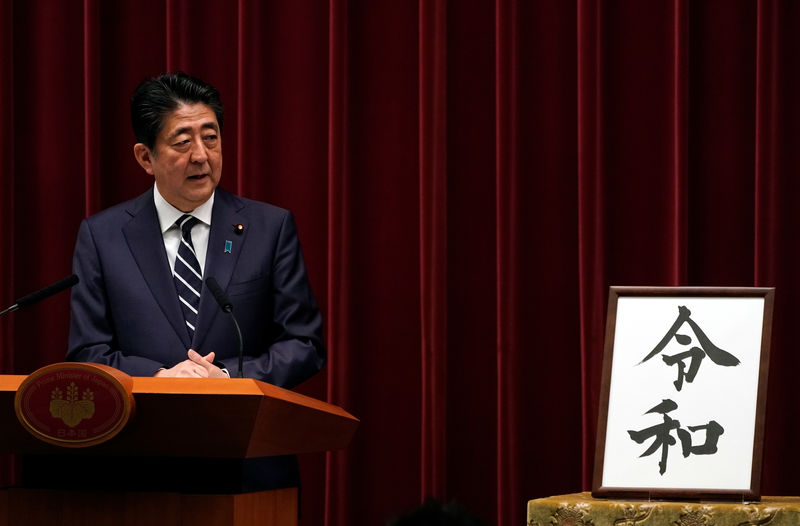By Elaine Lies and Malcolm Foster
TOKYO (Reuters) - Japan declared on Monday the name of its new imperial era when Crown Prince Naruhito becomes emperor on May 1, with Prime Minister Shinzo Abe saying it emphasized traditional values at a turning point in the nation's history.
Crowds watching giant television screens across Tokyo roared and raised their phones to take photos as a sombre Chief Cabinet Secretary Yoshihide Suga held up a white placard with the new name - Reiwa - written in two characters in black ink.
The country had been anxiously awaiting the new era name, or "gengo," which is used on coins, calendars, newspapers and in official paperwork, and over time captures a national mood.
The first character is most often used to mean "command" but can also mean "good" and "beautiful," while the second means "peace" or "harmony".
The name emphasizes the beauty of Japan's traditional culture and a future in which everyone would be able to achieve their dreams, especially young people, Abe said.
"Our nation is facing a big turning point, but there are lots of Japanese values that should not fade away," he told a news conference, adding the name signals that "our nation's culture is born and nourished by people's hearts being drawn beautifully together."
Naruhito's ascension to the Chrysanthemum Throne will come a day after his father, Emperor Akihito, abdicates on April 30, ending the Heisei era, which began in 1989. He will be the first emperor to abdicate in Japan in over two centuries.
The announcement came a month early so government offices and companies can update computer software and make preparations to avoid glitches when the new era begins.
While use of the Western calendar is common, many Japanese count years by gengo or use the two systems interchangeably.
JAPANESE POEM
While the public response was generally positive, some people did not like the new name, pronounced "ray-wa."
"It's a gentle, peaceful name," said Masaharu Hannuki, a 63-year-old man outside Shimbashi train station where free special edition newspapers were handed out. "We want this to be an era where children can shine in a calm future."
Others said it sounded severe because the first character is used most often to mean "command" and "order."
"The idea that you should just give in to orders from those above you -- that's probably their wish but that doesn't give me the sense they want peace for ordinary people," said one Twitter user.
For the first time, the new name was taken from an ancient Japanese source -- an anthology of poems called the Manyoshu -- instead of old Chinese texts.
The characters are from a poem about spring that mentions soft winds and plum blossoms -- references that scholars recognised but are not familiar to most people.
Abe stressed the history and positive interpretation of the name. Experts also said it reflected his conservative political agenda that emphasizes national pride.
"It's a collection that expresses our nation's rich culture, which we should take pride in, along with our nation's beautiful nature," Abe said. "We believe this national character should be passed along to the next era."
Makoto Ueno, a Manyoshu expert at Nara University, said the use of Japanese texts marked a significant change.
"It means the gengo has entered a new chapter," he said. "The system which originated with the Chinese emperor system has been made alive in Japan."
THE "REIWA" BUMP
The new name was a closely guarded secret, with officials involved forced to hand in their mobile phones and keep quiet.
When it was finally announced, Internet users rushed to register domain names linked to "Reiwa", which also sparked a jump in name-related stocks.
Guidelines stipulated that the era name should be appropriate to the ideals of the nation, consist of two "kanji," or Chinese characters, and be easy to write and read. It also can't be a repeat of a previous combination.
Scholars and bureaucrats had drawn up a list of candidates, and the cabinet made the final decision after consulting an advisory panel.
There have been four era names in Japan's modern history: Meiji (1868-1912), Taisho (1912-1926), Showa (1926-1989) and the current Heisei, meaning "achieving peace".
City offices and government agencies have been preparing for the new era name for months, aided by computer systems firms such as Fujitsu Ltd and NEC Corp. Many computer programmes have been designed to make it easy to change the gengo.
Over time, the gengo comes to symbolise the national mood of a period, similar to how "the '60s" evokes certain images, or how historians refer to Britain's "Victorian" or "Edwardian" eras, tying the politics and culture of a period to a monarch.
The three decades of the Heisei era saw the collapse of Japan's frothy "bubble" economy, years of economic stagnation, a series of natural disasters and the spread of social media.
"I hope it's an era with no war and one where everyone helps each other," said 13-year-old Miyu Sakamoto.
